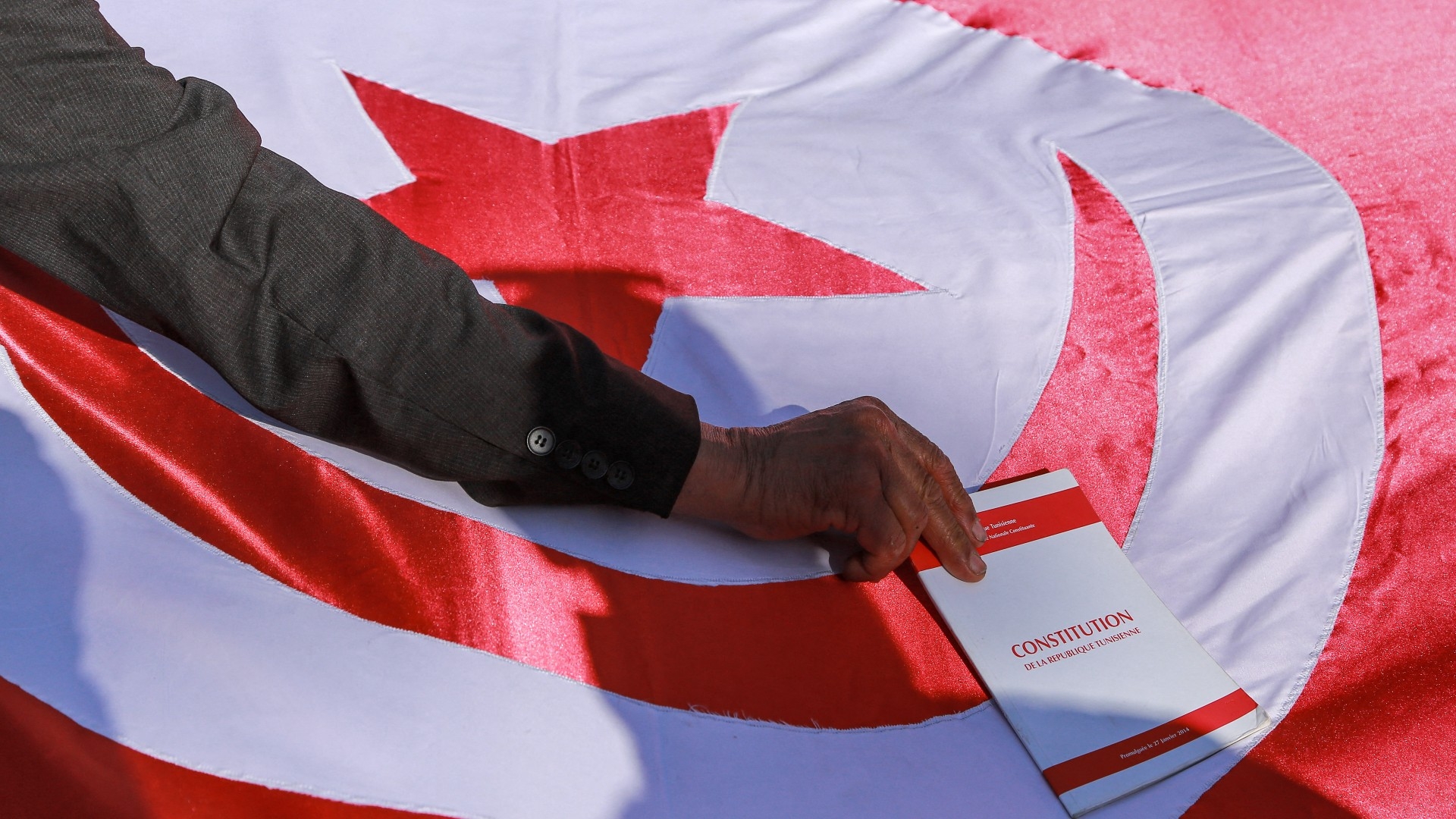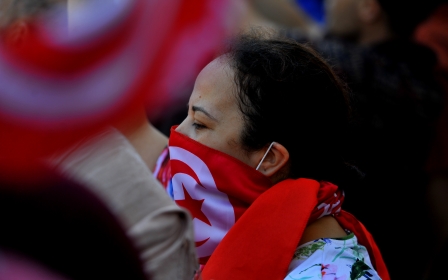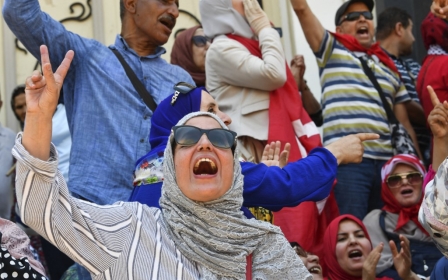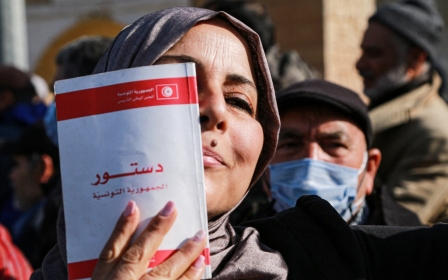Tunisia is voting on a new constitution. Here’s what you need to know

Tunisians are heading to the polls on Monday to vote on a new constitution put forward by President Kais Saied. If passed, it will grant him extensive executive, legislative, and judicial powers.
The 25 July date of the referendum is no coincidence - it marks exactly one year since Saied seized extensive powers and ruled by decree in what opponents described as a "constitutional coup".
Saied, himself a constitutional lawyer, was on a committee of experts who revised a draft of the 2014 constitution - the country’s first since the 2011 revolution - which he is now seeking to significantly change.
The president has urged citizens to vote in favour of the charter if they want to live a life where there is “no misery, nor terrorism”.
But critics have denounced the document as “dictatorial” and “theocratic”, codifying a “one-man rule”.
Ahead of the vote, Middle East Eye answers key questions about the new constitution.
Who wrote the new constitution?
While the 2014 constitution took two years to finish after lengthy consultations by a constituent-elected assembly, the new charter was written in just four weeks by a group of hand-picked jurists and law professors.
The proposed charter was drafted in June by a committee chosen by Saied and headed by jurist Sadeq Belaid.
As part of the process, the president also set up a national consultative commission, consisting of social, legal, and economic committees, as well as a national dialogue committee.
The commission and the drafting committee did not include any representatives from Tunisia's leading political parties, including Ennahda, Saied's main opponent, or the Free Constitutional parties.
The national commission had initially included the UGTT, the most powerful union in the country, but its leaders said the organisation would not participate in constitution talks.
After the first draft was published on 30 June, Belaid remarkably withdrew his support for the charter.
He said that the published document had “nothing to do with the text we drafted and submitted to the president”. Belaid added that one particular article would give the president “very wide powers…that could lead to a dictatorial regime”.
An updated version of the draft was published on 8 July following the criticism, but the amendments were mostly minor and made no changes to the range of powers that would be given to the president.
What changes does the charter propose?
The new constitution would effectively end the hybrid parliamentary-presidential system agreed following the revolution, and introduce a fully presidential system.
The president would appoint the prime minister and other cabinet ministers and have the power to unilaterally dissolve parliament.
Under the 2014 constitution, a parliamentary majority was required to form a government.
The president will also have the power to appoint judges, who will be banned from strikes, in an apparent reaction to the nationwide walkout held by judges last month to oppose Saied's sacking of 57 of their colleagues.
There will be no protocol for removing the president - something which the previous charter allowed for if there was a “blatant violation of the constitution”.
While there is still a two-term limit on the presidency, the 2014 provision that stipulated the constitution could not be amended to increase the number of terms has been removed.
What role will religion play in the new constitution?
In the early stages of the drafting process, Belaid initially stated that the new constitution would strip all references to Islam, in an apparent attempt to prevent political “extremism”.
However, there were in fact more references to religion in the June draft.
It amended the first article to remove the reference to Islam as "the religion of the state" but also scrapped Article 2 which defined the state as "civil," a word commonly used as a synonym for "secular" in the region.
Article 5 of the June draft stated: "Tunisia is part of the Islamic Ummah [worldwide community], and only the state shall work to implement the Maqased [principles of Sharia] of Islam in preserving life, honour, money, religion, and freedom."
That article was one of two minor amendments made on 8 July, when the phrase “within a democratic system” was added to it.
The clause has been criticised as “theocratic” by some critics, who have raised concerns about potential implications on religious minorities.
How did we get here?
The referendum is taking place on the anniversary of Saied's power grab last year.
In July 2021, the president suspended parliament and sacked the prime minister, in a seizure of extensive powers - first revealed by MEE two months prior - that saw him rule by decree.
Since then, Saied has shut down Tunisia’s independent anti-corruption body and sidelined the national election authority.
In early February, he dissolved the Supreme Judicial Council and granted himself control over the selection and promotion of judges.
The president says his actions were both legal and necessary to save Tunisia from an "imminent threat".
But critics view it as a significant setback for the pro-democracy revolution of 2011 and view the new constitution as a charter to permanently enshrine Saeid’s expanded powers.
How do Tunisians view the vote?
Saied draws much of his support from young Tunisians, who view him as an outsider professor-turned-politician keen to fix the country.
But those who backed his rise to power have told Middle East Eye they are split over the new constitution.
While some see it as a necessary step to end years of “corruption and misery”, others have denounced “populist” rhetoric and the lack of checks and balances in the new charter.
Meanwhile, Tunisia’s opposition - who view the referendum as an attempt to enshrine a “one-man rule” - are torn between voting “No” and boycotting Monday’s vote.
“Saied staged a coup, so all ensuing moves are illegal,” Ghazi Chaouachi, leader of the Attayar movement, the largest of five parties united in an anti-referendum campaign, told MEE.
“Saied is not entitled to call a referendum. He has destroyed our democracy and now he is imposing his constitution.”
Middle East Eye propose une couverture et une analyse indépendantes et incomparables du Moyen-Orient, de l’Afrique du Nord et d’autres régions du monde. Pour en savoir plus sur la reprise de ce contenu et les frais qui s’appliquent, veuillez remplir ce formulaire [en anglais]. Pour en savoir plus sur MEE, cliquez ici [en anglais].





